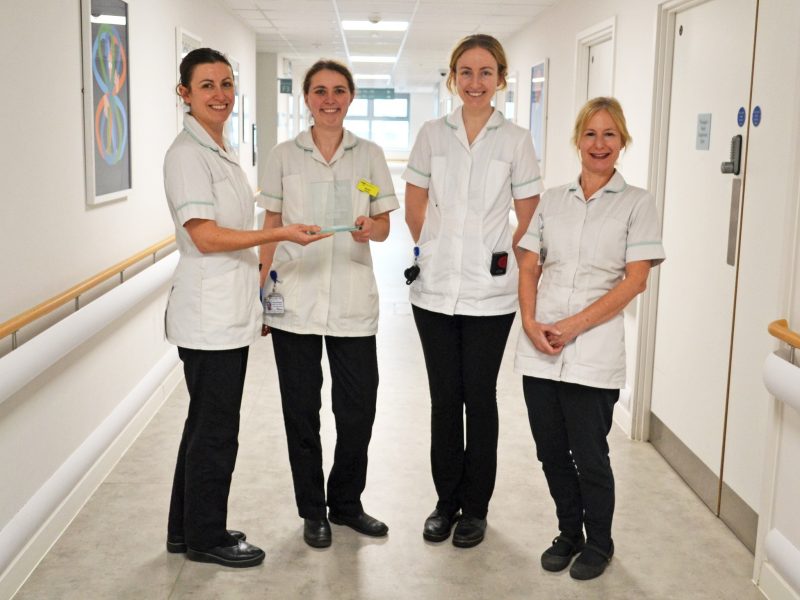By Harry Mottram: People with type 1 and 2 diabetes are being encouraged to take part in a study at the Royal United Hospital looking at how glucose monitoring sensors can help them to manage their blood glucose levels.
The small sensors are fitted on a patient’s arm using an applicator and last for 14 days.
Rachel Mathias, Diabetes Research Nurse, said: “We want to find out how useful patients find the sensors to monitor the impact that food, activity and medication has on their sugar levels.
“By being able to monitor their glucose levels regularly and easily, we are hopeful that they will be able to take action before they become poorly.
“The sensors also remove the need for regular finger-prick tests and can be easily attached to the arm by patients themselves.”
If you can be part of the RUH study, please email ruh-tr.DiabetesAndLipidsResearch@nhs.net or call 01225 824125.
The photo shows the RUH the Acute Dietetic team for winning a Working Together Award this month.
Information on Diabetes from the NHS:
Diabetes is a condition that causes a person’s blood sugar level to become too high.
There are 2 main types of diabetes:
- type 1 diabetes – a lifelong condition where the body’s immune system attacks and destroys the cells that produce insulin
- type 2 diabetes – where the body does not produce enough insulin, or the body’s cells do not react to insulin properly
Type 2 diabetes is far more common than type 1. In the UK, over 90% of all adults with diabetes have type 2.
High blood sugar that develops during pregnancy is known as gestational diabetes. It usually goes away after giving birth.
Non-diabetic hyperglycaemia (pre-diabetes)
Many people have blood sugar levels above the normal range, but not high enough to be diagnosed as having diabetes. This is known as non-diabetic hyperglycaemia, or pre-diabetes.
People with non-diabetic hyperglycaemia are at greater risk of developing type 2 diabetes, but the risk can be reduced through lifestyle changes.
If you have non-diabetic hyperglycaemia, you may be eligible for the NHS Diabetes Prevention Programme. The programme helps people make lasting lifestyle changes and has been shown to help prevent type 2 diabetes.
People with non-diabetic hyperglycaemia are also recommended to have a blood test every year to monitor their blood sugar levels.
It’s very important for diabetes to be diagnosed as early as possible because it’s likely to get worse if left untreated and can cause long-term health problems.
When to see a GP
Visit your GP as soon as possible if you experience the main symptoms of diabetes, which include:
- feeling very thirsty
- peeing more frequently than usual, particularly at night
- feeling very tired
- weight loss and loss of muscle bulk
- itching around the penis or vagina, or frequent episodes of thrush
- blurred vision
Type 1 diabetes can develop quickly over weeks or even days.
Weight loss is common in people with type 1 diabetes when it first develops and before it’s treated, but it’s less common in people with type 2 diabetes.
Many people have type 2 diabetes for years without realising because the early symptoms tend to be general, or there are no symptoms at all.
Causes of diabetes
The amount of sugar in the blood is controlled by a hormone called insulin, which is produced by the pancreas (a gland behind the stomach).
When food is digested and enters your bloodstream, insulin moves glucose out of the blood and into cells, where it’s broken down to produce energy.
However, if you have diabetes, your body is unable to break down glucose into energy. This is because there’s either not enough insulin to move the glucose, or the insulin produced does not work properly.
There are no lifestyle changes you can make to lower your risk of type 1 diabetes.
You can reduce the risk of type 2 diabetes through healthy eating, regular exercise and achieving a healthy body weight.
You may be more at risk of type 2 diabetes if you:
- are living with overweight or obesity
- do not have a healthy diet
- have a family history of type 2 diabetes
- are of Asian, Black African or African Caribbean origin
- take certain medicines such as steroids for a long time
- have high blood pressure
- have had gestational diabetes during pregnancy
Living with diabetes
If you’re diagnosed with diabetes, you’ll need to eat healthily, take regular exercise and have regular checks including blood tests.
You can use the BMI healthy weight calculator to check whether you’re a healthy weight.
Try to quit smoking if you smoke, and cut down on alcohol.
People diagnosed with type 1 diabetes also require regular insulin injections for the rest of their life.
Type 2 diabetes can get worse over time and people living with type 2 diabetes often need medicine, usually in the form of tablets or injections.
However, some people can put their type 2 diabetes into remission by losing weight, where their blood sugar is reduced below the diabetes range. Some people are able to do this through a low-calorie diet, but this is not suitable for everyone, so it’s important to get medical advice first.

Bath Voice Monthly Newspaper is distributed free to thousands of homes and some supermarkets – distributed from the first of the month. Harry Mottram is the News Editor
Email him at news@bathvoice.co.uk Bath website: https://bathvoice.co.uk/news/
Bath Facebook: https://tinyurl.com/bdtf2kep Also on Twitter: https://twitter.com/bath_voice Read the newspaper online at :https://issuu.com/bathvoice To advertise to thousands of Bathonians call Erica on 07402 441485 or email her on erica@bathvoice.co.uk
Harry Mottram is a freelance journalist. Follow him on Facebook, LinkedIn, Twitter, Instagram, YouTube, Pinterest, Telegram, TikTok and Email:harryfmottram@gmail.com
Website:www.harrymottram.co.uk Mobile: 07789 864769

